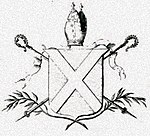| Alexander Neville | |
|---|---|
| Archbishop of York | |
| Elected | November 1373 |
| Installed | 18 December 1374 |
| Term ended | 30 April 1388 |
| Predecessor | John of Thoresby |
| Successor | Thomas Arundel |
| Other post(s) | Bishop of St Andrews (Roman candidate) 1388–1392 |
| Orders | |
| Consecration | 4 June 1374 |
| Personal details | |
| Born | c. 1340 |
| Died | May 1392 (aged approximately 52) Leuven |
| Buried | Church of the Carmelites, Leuven |
| Denomination | Roman Catholic Church |
| Parents | Ralph Neville, 2nd Baron Neville de Raby and Alice de Audley |
Alexander Neville (c. 1340–1392) was a late medieval prelate who served as Archbishop of York from 1374 to 1388.
Life
Born around 1340, Alexander Neville was a younger son of Ralph Neville, 2nd Baron Neville de Raby and Alice de Audley. He was a member of the Neville family, one of the most powerful families in the north of England.
Neville's first known ecclesiastical appointment was as a canon of York Minster, holding the prebendary of Bole from 1361 to 1373. He became a claimant to the Archdeaconry of Cornwall from 1361 until it was set aside in 1371, becoming instead Archdeacon of Durham from circa 1371 to 1373. He was appointed Archbishop of York on 3 or 14 April 1374, having been elected by the chapter of York in November 1373 and received royal assent on 1 January 1374. He was consecrated to the episcopate at Westminster on 4 June 1374 and enthroned at York Minster on 18 December 1374.
On the Lords Appellant rising against King Richard II in 1386, however, Neville was accused of treason and it was determined to imprison him for life in Rochester Castle.
Neville fled, and Pope Urban VI, pitying his case, translated him to the Scottish see of St. Andrews on 30 April 1388. However, he never took possession of the see because the Scots acknowledged the Avignon papacy with their own candidate, Walter Trail.
For the remainder of Neville's life he served as a parish priest in Leuven, where he died in May 1392 and was buried there in the Church of the Carmelites.
Citations
- ^ "Alexander Neville (c.1340–1392)". Biographies. Britannia. Archived from the original on 4 March 2016. Retrieved 11 November 2010.
- Jones 1963, Northern Province: Prebendaries of Bole, pp. 34–36.
- Horn 1962, Exeter Diocese: Archdeacons of Cornwall, pp. 15–17.
- Jones 1963, Northern Province: Archdeacons of Durham, pp. 111–113.
- Fryde et al. 1986, Handbook of British Chronology, p. 282.
- Jones 1963, Northern Province: Archbishops of York, pp. 3–5.
- ^ Fryde, et al. Handbook of British Chronology p. 282
- Dowden 1912, The Bishops of Scotland, pp. 27–28 and 45.
- Dowden 1912, The Bishops of Scotland, p. 45.
References
- Cokayne, G. E. (2000). The Complete Peerage: Rickerton to Sisonby. Vol. IX (Reprint ed.). Gloucester: Sutton Publishing. ISBN 0-904387-82-8.
- Dowden, John (1912). Thomson, J. Maitland (ed.). The Bishops of Scotland. Glasgow: James Maclehose and Son.
- Fryde, E. B.; Greenway, D. E.; Porter, S.; Roy, I., eds. (1986). Handbook of British Chronology (3rd, reprinted 2003 ed.). Cambridge: Cambridge University Press. ISBN 0-521-56350-X.
- Horn, J. M. (1962). Exeter Diocese. Fasti Ecclesiae Anglicanae 1300–1541. Vol. IX. British History Online.
- Jones, B. (1963). Northern Province (York, Carlise and Durham). Fasti Ecclesiae Anglicanae 1300–1541. Vol. VI. British History Online.
| Catholic Church titles | ||
|---|---|---|
| Preceded byJohn of Thoresby | Archbishop of York 1374–1388 |
Succeeded byThomas Arundel |
| Bishops and archbishops of St Andrews | ||
|---|---|---|
| Known pre-Norman era bishops |  | |
| Scoto-Norman era bishops |
| |
| Pre-Reformation archbishops | ||
| Post-Reformation archbishops | ||
| Afterwards, see also: Episcopal Archbishops of St Andrews, Bishops of St Andrews, Dunkeld and Dunblane (etc.) & Roman Catholic Archbishops of St Andrews and Edinburgh (etc.) | ||